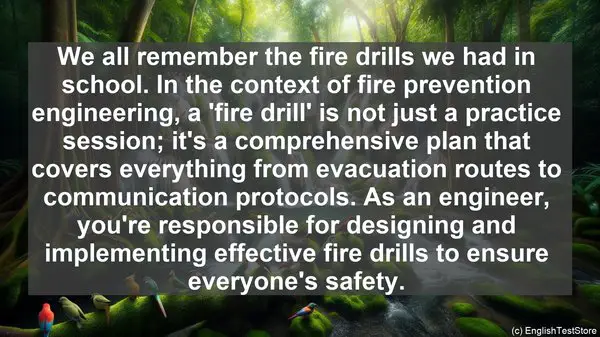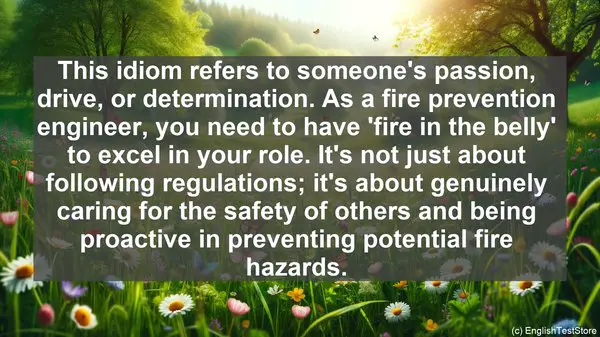Introduction: The Power of Idioms
In the world of language, idioms are like hidden treasures. They add color, depth, and cultural references to our conversations. Today, we’re diving into the realm of fire prevention engineering and exploring the top 10 idioms that can help you communicate better in this field. So, let’s get started!
1. ‘Playing with Fire’
This idiom is often used to describe a situation where someone is taking a risk, even though they are fully aware of the potential danger. As a fire prevention engineer, your job is to ensure that people don’t ‘play with fire’ in the literal or metaphorical sense. You’re the one who assesses risks, creates safety protocols, and ensures that everyone follows them.
2. ‘Fire in the Belly’
This idiom refers to someone’s passion, drive, or determination. As a fire prevention engineer, you need to have ‘fire in the belly’ to excel in your role. It’s not just about following regulations; it’s about genuinely caring for the safety of others and being proactive in preventing potential fire hazards.
3. ‘Fire Drill’
We all remember the fire drills we had in school. In the context of fire prevention engineering, a ‘fire drill’ is not just a practice session; it’s a comprehensive plan that covers everything from evacuation routes to communication protocols. As an engineer, you’re responsible for designing and implementing effective fire drills to ensure everyone’s safety.
4. ‘Smoke and Mirrors’
In the world of fire prevention, ‘smoke and mirrors’ refers to deceptive practices or measures that give a false sense of security. As an engineer, it’s crucial to identify and eliminate any ‘smoke and mirrors’ situations. Your goal is to have robust, transparent, and foolproof fire prevention strategies in place.
5. ‘Hot Seat’
Imagine a situation where there’s a fire incident, and all eyes are on you as the fire prevention engineer. That’s what being in the ‘hot seat’ means. As an engineer, you need to stay calm, make quick decisions, and coordinate with other stakeholders effectively. It’s a high-pressure role that requires both technical expertise and leadership skills.
6. ‘Fire Sale’
In the business world, a ‘fire sale’ refers to a situation where products or assets are sold at a significantly reduced price, often due to an urgent need for cash. In the context of fire prevention, a ‘fire sale’ can refer to the aftermath of a fire incident, where damaged or compromised assets need to be replaced or repaired quickly.
7. ‘Spark of Inspiration’
As a fire prevention engineer, you’re not just focused on the technical aspects. You also need to come up with innovative solutions and ideas. A ‘spark of inspiration’ can lead to a breakthrough in fire prevention strategies or technologies. So, always be open to new ideas and approaches in your field.

8. ‘Fan the Flames’
While the literal meaning of ‘fan the flames’ is to increase the intensity of a fire, in the idiomatic sense, it means to worsen or escalate a situation. As an engineer, your role is to do the opposite. You need to ‘douse the flames’ and prevent any situation from getting out of control.
9. ‘Burning the Midnight Oil’
Fire prevention is not a 9-to-5 job. There might be situations where you need to work late into the night, analyzing data, conducting inspections, or preparing reports. ‘Burning the midnight oil’ is a common phrase used to describe such dedicated and intense work. It’s a testament to your commitment to ensuring fire safety.
10. ‘Out of the Frying Pan, Into the Fire’
This idiom is often used to describe a situation where someone escapes from a difficult or dangerous situation, only to end up in an even worse one. As an engineer, your goal is to prevent such scenarios. You’re the one who anticipates risks, takes proactive measures, and ensures that people are always safe, even in challenging situations.

Conclusion: The Language of Fire Prevention
Language is a powerful tool, and idioms are its hidden gems. By understanding and using these idioms, you not only enhance your communication skills but also become a part of the rich tapestry of the fire prevention engineering community. So, keep exploring, keep learning, and let the language of fire prevention guide your journey. Thank you for watching!
